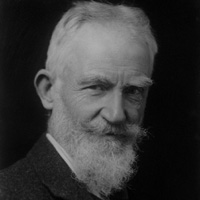Major Barbara by George Bernard Shaw: Introduction
Major Barbara by George Bernard Shaw written in 1905 and published in 1907 has been called the most controversial of Shaw's works. When the play was first produced at the Royal Court Theatre in London in 1905, the early reviews were mixed. Shaw's vehement criticism of Christianity triggered some critics to accuse him of blasphemy.

George B. Shaw (1856-1950)
There were other critics who defended stating that he has made a realistic presentation of the religion. The play is popular among the people and an It remains popular and an adaptation was done to film in 1941. Today this play is considered to be a very important work, not only among Shaw's plays, but also in the history of modern drama.
Major Barbara dealt with the validity of religious and charitable organizations like Salvation Army. He ridicules the superficial family ties of the rich where nothing is sacred except money. Finally, the play has a socialist leaning, for it questions capitalism, especially the exploitation of the workers by larger industrialists. The play owes its origins to Shaw’s personal experiences, for he often observed the girls of the Salvation Army conducting meetings and judged them to be hypocritical.
Major Barbara represents two camps of people supporting war and peace. Andrew Undershaft represents that camp, which loves war and professor Cusins and Barbara represent that camp which love peace. The play makes an indirect reference to the problem of the exploitation of the common laborer due to the industrialization process. In the play the exploited workers come into the Salvation Army shelter. This part of the action in the play reflects the existing social problem from which the nineteenth century English society was suffering.
In keeping with the mode of realism the play slightly makes satirical gestures towards the British politics. Andrew asks “what do you hope to become in future my love Stephen?” to his twenty three year old son. The son replies, “I enter politics.” Andrew reports “what? Politics? Hope to be a prime minister? Don’t you know that the prime minister of your country is under my grip?”
Shaw expresses his view on poverty, ethics, and politics through Undershaft who ridicules the intellectuals and moralists who consider poverty as a virtue. Andrew Undershaft is the mouthpiece of Shaw.
As the play is a discussion play Barbara and Andrew discusses on the issue of idealism represented by Barbara and realism represented by Andrew. In an indirect or direct manner Shaw has raised many issues in the play. Almost all these issues bear social and political significance. Thematically the play is transparent because the action of the play is a long philosophical discussion.
Major Barbara Study Center
Major Barbara as a Play of Discussion of Ideas
Barbara as Defeated Idealism in Bernard Shaw's Major Barbara
Andrew Undershaft as a Mouthpiece of Bernard Shaw in Major Barbara
Major Barbara Study Center
Shaw's Dramatic Technique in Major Barbara
Biography of George Bernard Shah
 |
bachelorandmaster.com |